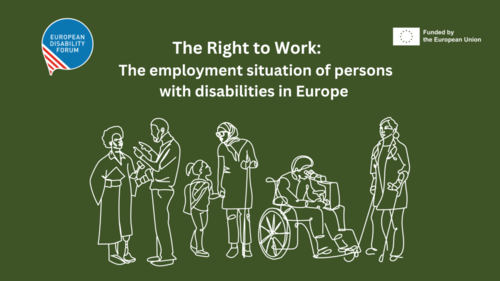EDF's new Human Rights Report 'Right to Work' shows that the majority of persons with disabilities are locked out of quality employment
April 27 2023, 03:38pm

The European Disability Forum’s new Human Rights report The Right to Work, released today, reveals the persistent gap in access to quality employment for persons with disabilities. The report shows that only 51.3% of active, working-age persons with disabilities in the EU are in paid employment. Furthermore, women and young people are at a disadvantage: only 49% of women and 47.4% of young people with disabilities are in paid employment.
The situation is especially bad in 4 EU countries. Greece and Ireland lead this “hall of shame”, with less than a third (32.6%) of persons with disabilities employed. Croatia follows with only 37% and Spain with 39%.
It gets worse when considering full-time employment, especially for women with disabilities. In 11 countries, less than 20% of women with disabilities are employed full-time. Among the offenders: Ireland, Belgium, Spain, Italy, Malta, Poland, Hungary, Croatia, Romania, Bulgaria, and Greece. This is despite women with disabilities being, on average, more educated than men with disabilities.
The chasm between employment rates of persons with disabilities and without disabilities – the “disability employment gap” – is clear, and it varies wildly. The EU average is 24.4 percentage points – but the gaps in the worst-performing Member States are much wider: Ireland - at nearly 40 percentage points - 38.6; Belgium - 36.3 percentage points; and Bulgaria - 33 percentage points). The lowest gap (Portugal) is still 18.2 percentage points.
Reasons for the disability employment gap
The report found several reasons for this gap – chief among them the lack of provision of reasonable accommodation, the structural discrimination and bias suffered by persons with disabilities, and the lack of access to inclusive and quality education.
Regarding reasonable accommodation, common issues include limited funding and support, the excessive bureaucracy to access reasonable accommodation (a burden both to employers and employees), and limited availability of information regarding State support. Despite the EU employment equality directive having been in place since 2000, reasonable accommodation guidelines do not exist, and even simple requests such as moving to part-time work are often denied. This leads to unfair practices – for example, Zuzana from Czechia had to stop working due to a lack of access to personal assistance.
Structural bias and discrimination exist at every step: from employment services during the job search to when employed, passing through the recruitment process. For example, Annika, from Austria, was in her thirties when she was told to apply for a disability pension - as the employment services couldn’t think of where to place her despite her professional qualifications. Margrét, an Icelandic woman that works at an embassy, reports that supervisors often decide not to assign her tasks because of her disability – without consulting her. Not an isolated case - a survey in Germany in 2019 reported that 58% of respondents with disabilities suffered discrimination at work. And that is when they pass the recruitment processes – themselves littered with accessibility issues and bias.
Earning less
The report also reveals that persons with disabilities still earn less when employed, even though they need more income to face the additional costs of living in a discriminatory and inaccessible society. Housing and transport costs, for example, pose a disproportionately high burden for persons with disabilities compared to persons without disabilities. The report explains that persons with disabilities also incur higher costs for being employed, such as paying for special transportation due to inaccessible public transport, extra for personal assistance at more convenient hours, etc.
This is why the report launched today calls on EU countries to continue providing disability allowances even when people are in full-time employment – as a means to offset these costs. It is still common for workers with disabilities in EU Member States to lose most or all their disability allowance when beginning to work. In fact, persons with disabilities are more likely to face in-work poverty than persons without disabilities.
Harmful employment models
The report also highlights the common use of harmful employment models that – while often created with good intentions – end up segregating and, in some cases, taking advantage of persons with disabilities. Sheltered employment models – undertakings that generally employ a majority of persons with disabilities in closed settings – are especially problematic as workers often have lower salaries (sometimes under minimum wage), poor conditions, fewer career opportunities and lack of stability.
Recommendations
The report sets up a series of recommendations for public authorities – including the EU and its countries to:
- Allow persons to retain disability allowances when in gainful employment;
- Ban the practice of paying persons with disabilities below minimum wage – and promote employment models that facilitate transition towards inclusion in the open labour market;
- Promote effective practices to access reasonable accommodation and employ persons with disabilities affected by other forms of marginalisation.
Yannis Vardakastanis, President of the European Disability Forum, said: “Our report clearly shows that there is a chasm between our own experiences and those of persons without disabilities. The EU and its Member States can no longer continue to exclude us – and that is why we call for a Disability Employment and Skills Guarantee that helps to level the playing field."
Member of the European Parliament Katrin Langesiepen, Chair of the European Parliament’s Disability Intergroup and Vice-chair of the Committee on Employment and Social Affairs, stated: "Having a job is vital in our lives. As is shown in this publication, there is a very real issue of persons with disabilities being cut off from the labour market entirely and a parallel crisis for those who do manage to find work being paid below minimum wage, employed in segregated settings and deprived of their basic rights."
Source: European Disability Forum
ENDS
